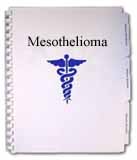Mesotheliona Symptoms and Diagnosis
Mesothelioma Symptoms
The most common symptoms of pleural
mesothelioma are difficulty in breathing, chest pain,
or both. Occasionally, a patient may not have symptoms at
diagnosis. Other less common symptoms include weight loss,
fever, night sweats, cough, and a general feeling of not being
well. Symptoms of peritoneal
mesothelioma may include swelling, pain due to accumulation
of fluid in the abdomen cavity, weight loss, and a mass in
the abdomen. Other symptoms of peritoneal mesothelioma may
include bowel obstruction, blood clotting abnormalities, anemia
(a lowered red blood cell count), and fever.
Mesothelioma Diagnosis
It can be difficult to diagnose mesothelioma
because many of the symptoms are similar to those of a number
of other conditions, including lung cancer and other types
of cancers. At the time of diagnosis, your doctor will first
do a physical examination and complete a medical history,
including asking about the possibility of prior exposure to
asbestos.
Although there is no early detection test for mesothelioma, there
are several tests that can be used to help in making the diagnosis
of mesothelioma, including a chest x-ray, a CT scan, or an MRI scan.
A chest x-ray yields an image of the lungs that will show many types
of abnormal changes. A CT scan (computed tomography) is a type of
x-ray, but it uses a computer rather than film to create detailed
images.
An MRI scan (magnetic resonance imaging) uses magnetism,
radio waves, and a computer but does not utilize radiation to create
a clear image. These tests help your doctor differentiate mesothelioma
from other lung tumors as well as determine where the tumor is and
its size.
Your doctor may need to
remove a tissue sample from the tumor (a biopsy) or draw fluid (aspirate) from
it to confirm the diagnosis. This can be done in several ways.
The simplest way to
obtain tissue samples involve making a small incision and placing a flexible
tube in the area of the tumor. This is called a thoracoscopy if it is done in
the chest area. A laparoscopy is the same procedure, but done in the abdominal
cavity. A tube that is attached to a video camera is placed so the doctor can
look inside the body. A tissue sample may be taken at the same time. Sometimes,
however, a more extensive surgical procedure may be advisable. A thoracotomy
can be done to open the chest to take a tissue sample and, if feasible, to
remove most or all of the visible tumor. If this procedure is done in the
abdominal cavity, it is called a laparotomy.
At other times, a
mediastinoscopy may be done in which a very small incision is made just above
the sternum (breast bone) and a tube inserted just behind the breast bone. This
lets the doctors look at lymph nodes. These are small, bean-shaped structures
that are an important part of the body's immune system, and they contain cells
that help your body fight infection, as well as cancer. This test will give the
doctor more information on the type of cancer and whether it has spread to
other areas. The tissue samples taken in these procedures are analyzed by
looking at them under a microscope in order to determine whether the tumor is
mesothelioma or some other type of cancer.
Find out more about... Mesothelioma
Staging
|

































